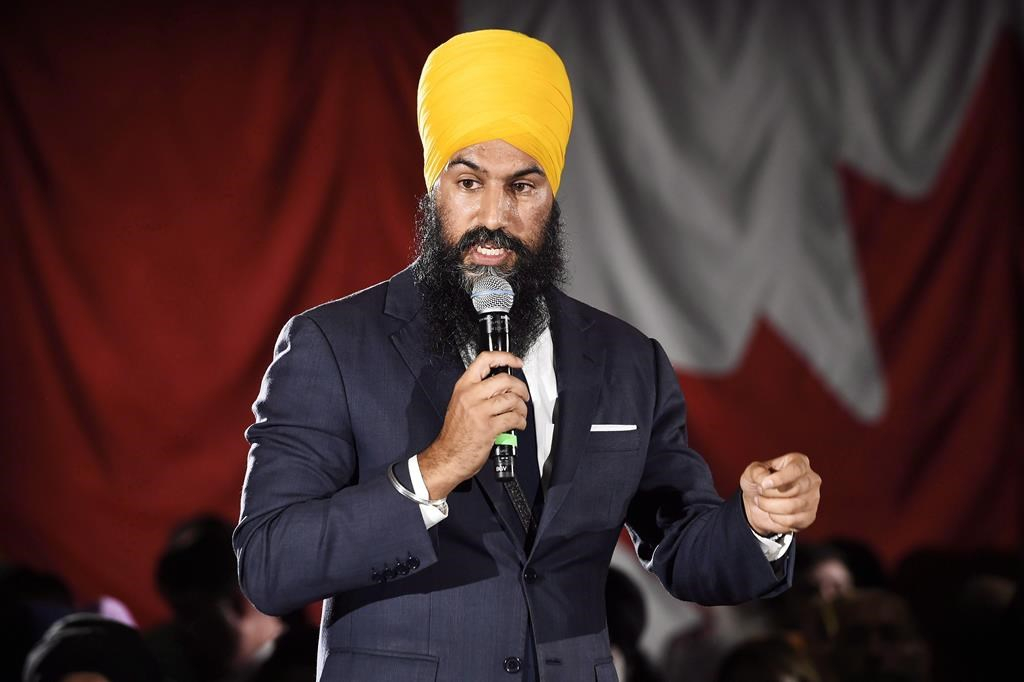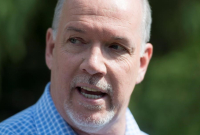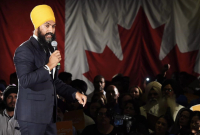Support strong Canadian climate journalism for 2025
Federal NDP leadership hopeful Jagmeet Singh felt compelled during Wednesday's debate in Victoria to tack on an adjective to what he considers a key difference between the New Democrat governments in Alberta and British Columbia.
"There is some disagreement on an energy project," Singh said, referencing the controversial Trans Mountain pipeline expansion.
Singh, a legislator in Ontario, paused as the crowd laughed, then smiled and added, "Big disagreements."
Singh spoke alongside fellow leadership candidates Niki Ashton and Guy Caron, both of whom are members of parliament.
All three were asked how they would reconcile the discord between the various New Democrat factions that all fall under the same orange umbrella.
The question was an obvious one for Western Canadians in provinces led by NDP governments whose views on Kinder Morgan's multibillion-dollar pipeline proposal couldn't be more different.
Newly sworn-in B.C. Premier John Horgan said in this spring's election campaign that he would use every tool at his disposal to block the project, while Alberta Premier Rachel Notley has said unequivocally that the pipeline will be built.
Caron said the dispute between Alberta and B.C. around Kinder Morgan was foreseeable and could have been avoided through earlier communication.
"We have the same members all across the country but we don't talk," he said. "We should have been able to talk this through before it degenerated."
Ashton said the NDP is stronger when members work together.
Affordable housing, the opioid crisis and Indigenous issues were also discussed.
Ashton said that as an NDP prime minister, she would invest $10 billion in housing and pledged to build 40,000 units of social and affordable housing annually. She also endorsed the adoption of the United Nations Declaration on the Rights of Indigenous Peoples.
"We have to talk about not fighting First Nations in court, which the federal government is doing every single day," Ashton said.
"They are forcing First Nations that are already strapped in terms of resources to go to court to simply fight for the rights that are already theirs."
Federal MP Charlie Angus was unavailable to attend the event because of health issues in his family, but he addressed the crowd in a recorded video at the outset of the debate.
The debate comes at a key time for all of the candidates as they push to sign up as many party members as possible before a registration cutoff on Aug. 17. Voting is scheduled to begin in mid-September.
Singh's campaign appears to be resonating with politicians in British Columbia, where he has earned the support of eight provincial legislators and four B.C. MPs including, most recently, Alistair MacGregor, the caucus justice critic.
MPs Randall Garrison, Kennedy Stewart and Jenny Kwan have also endorsed Singh.
"He's really catching on here and I'm happy to be someone who has joined that team," MacGregor said in an interview.
"I just think he is a really energetic, engaging, dynamic individual who I think is going to make a very real impact if he becomes the leader of our party."
Elections Canada figures released this week indicate Singh led the fundraising pack with $353,944 in the second quarter.
Angus raised $123,574 during the same period while Ashton pulled in $70,124. Caron raised $46,970.





Comments
The dispute has a simple resolution. Send undiluted bituen by rail from Alberta to a BC port.
Advantages are:
- the rail line already exists so new pipeline is needed
- almost no danger to the BC coast as the undiluted bitumen behaves like peanut butter and is readily cleaned up if spilled.
- the proof that it can be done exists with present rail shipments to the USA
- it can be stopped if it is found to be uneconomic, or for other reasons.
- the economics are comparable for the two, but the pipeline only makes sense if it is to be used for decades, something that our climate commitments can not allow.